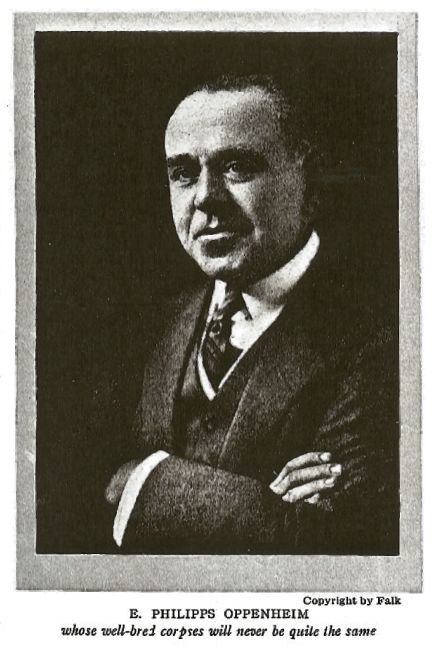Vanity Fair, July 1915
SOME THOUGHTS ON MR. OPPENHEIM
By P. G. Wodehouse
ONE of the worst features of the Great War would seem to be that, as far as the best and most thrilling side of his work is concerned, it must of necessity put Mr. E. Philipps Oppenheim out of business. He may, and no doubt will, continue to write excellent sensational stories, but we fear that what might be called the “International Spy” element in his fiction is doomed.
You know how the Oppenheim novel starts out. As he sups at London’s most expensive and exclusive restaurant, the notice of the hero is attracted by a beautiful girl in company with a distinguished and red-ribbony sort of man. Enquiry elicits the fact that this is the French Ambassador.
Why is he in London? Nobody knows. To those in close touch with international politics his presence there is sinister. The hero returns to his hotel, thinking deeply, and stubs his toe on something soft and squdgy under the bed. It is the body of the French Ambassador. Pinned to the corpse is a card, on which, in a disguised hand, are written the words “At-a-boy! Keep-a-working!” At this moment there is a tap at the window, the beautiful girl enters from the fire-escape, hands the hero a sealed envelope marked “Important papers. Keep dry,” and retires. The rest of the story deals with the various attempts of mysterious plug-uglies to give the hero his. In the end it turns out that the envelope contains material which, if disclosed, would inevitably plunge Europe into a general conflict.

But now all the European powers have suddenly come out into the open. They have ceased to plot and begun to fight. Platoons of beautiful girls could inundate an Oppenheim hero with letters and he would light his pipe with them.
It is a great pity, for, if there was one safe refuge from weariness and depression to which we could fly at will, it was these behind-the-scenes novels of Mr. Oppenheim. There has never been anyone quite like him. He raised the sensational novel to a niche higher than it had ever dreamed of reaching. His easy, distinguished style, the naturalness of his dialogue, and the wonderfully expert story construction in them made his novels unique.
OF course, he will continue to supply us with perfectly good murders, but his assassins will be mere amateurs, working to gain some private end, not polished schemers in the pay of a great power, with all that power’s complicated system of espionage behind them. No, it will not be the same. We shall miss the teamwork. In “The Great Secret” spies took the whole floor of the hotel where the hero lived in order to be able to go about their job of eliminating him with that leisure so essential to Oppenheim assassins.
That is good.
That has the spacious touch. And now this War comes along and spoils it all.
We shall always be glad to welcome Mr. Oppenheim’s well-bred corpses, but, somehow, they will never be quite the same.
We reproduce the spelling as given in Vanity Fair, but in fact Oppenheim’s middle name was Phillips.
 Madame Eulalie’s Rare Plums
Madame Eulalie’s Rare Plums